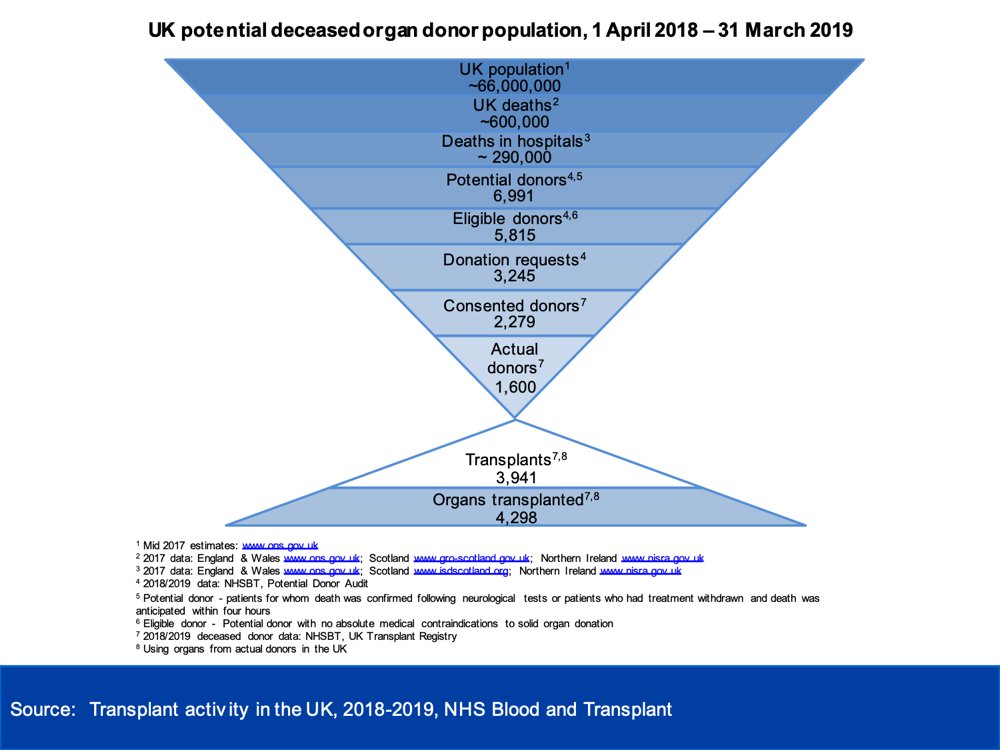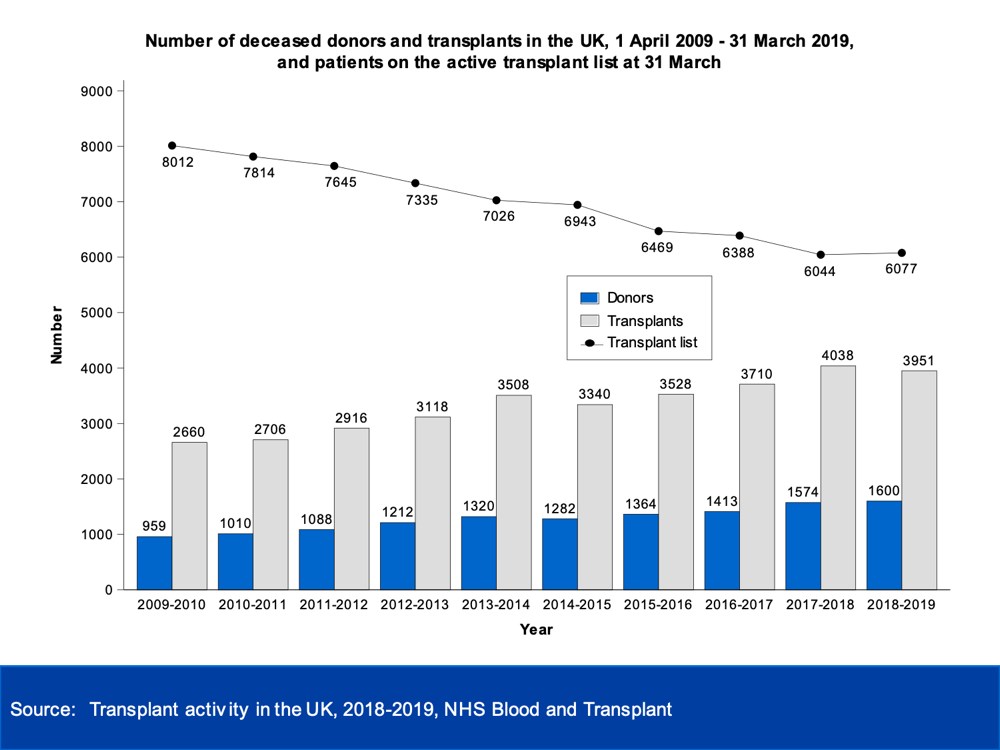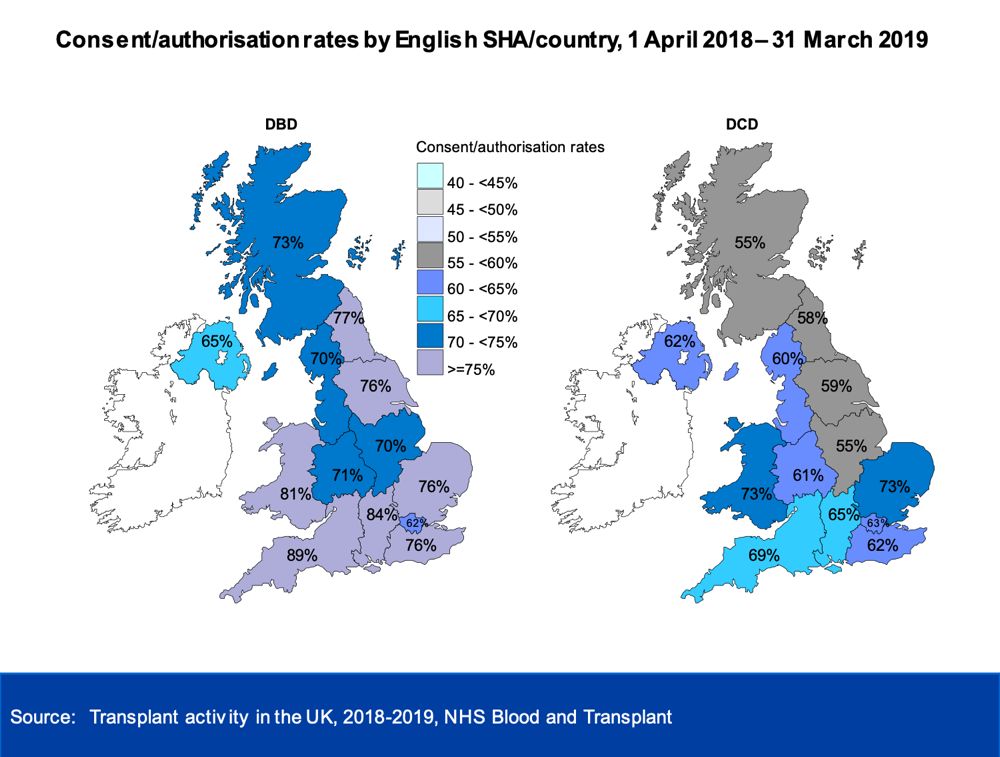Highest Ever Number of Organ Donors Last Year
The annual Organ Donation and Transplantation Activity Report from NHS Blood and Transplant was published this month for the year 2018/19.
What's in the Full Annual Activity Report?
The Annual Activity Report gives a comprehensive update about organ donors, transplant waiting lists and transplant activity for the UK for the latest financial year.
Survival rates after transplantation are also provided for transplants over a number of years, as well as data from the Potential Donor Audit and the Organ Donor Register.
It includes UK-wide as well as country, regional and centre specific data. Rates of donors and transplants per million of population are included alongside information about waiting times to transplant, organ utilisation rates and demographic characteristics of both donors and recipients.
A more detailed, liver-specific report will be published by NHSBT in Autumn.
Here's a brief overview of the key facts raised in the latest report:
Increase in Organ Donors
The 1,600 people in the UK who donated their organs after they died have saved or improved the lives of 3,941 transplant recipients and given hope to those on the transplant waiting list.
This was achieved despite a 4% drop in eligible donors, with 225 fewer eligible donors overall than in 2017/18.
With fewer eligible donors, it is more important than ever to ensure that everyone who is able and wants to donate their organs after they have died, is given the opportunity.
Organ donor numbers are higher than ever thanks to:
- More families agreeing to support donation
- Fewer families refusing to supportive a relative's decision to donate
- Increased referral rate of potential donors by medical staff

Fewer Transplants
Despite the rise in donations, the overall number of transplants was slightly down, with 87 fewer organ transplants taking place than the previous year (3,951 in 2018/19 compared to 4,038 in 2017/18).
The reasons for this decrease are complex and still being fully explored by the organ donation and transplantation community.
However, the decrease in transplant numbers may be due to organ donor characteristics such as:
- Higher number of older donors
- An increased number of donors with additional or pre-existing medical conditions
- Reduction in the proportion of donors dying from trauma injuries

Highest Consent Rate Success in Wales
In 2020, the law around organ donation will be changing in both England and Scotland. Both countries will be introducing an opt out system for organ donation, just as Wales did in December 2015 and Jersey from 1st July 2019.
Wales now has the highest consent rate of all the UK nations, now 77%, up from 58% in 2015. It is hoped that once the law change comes into force in both England and Scotland, and as awareness of organ donation increases, we will see similar increases across both these countries.
The figure below shows the consent/authorisation rates by country/Strategic Health Authority for both donor organs after brain death (DBD) and donor organs after circulatory death (DCD) (not just liver).

Liver Transplantation in 2018/19
The annual Activity Report contains a section on liver transplantation. On 20 March 2018, the new National Liver Offering Scheme (NLOS) was introduced for offering livers from donors after brain death.
The number of patients on the active liver transplant list at 31 March 2019 was 432, an increase of 20% from 2018.
The number of deceased liver donors and transplants in the UK in the last ten years is shown below. Over this period, there has been an increase in the number of patients registered on the active transplant list at 31 March, although this number has fallen in recent years. The numbers of donors and transplants has steadily increased over the last decade. This year, the number of liver donors decreased slightly to 1113, while transplants fell by 3% to 981.

Gratitude to Organ Donors and Their Families
Anthony Clarkson, Director of Organ Donation and Transplantation at NHS Blood and Transplant, comments:
“No lifesaving transplant would be possible without the generosity of every donor and their families, who give their support and say ‘yes’ to organ donation.
“It is testament to the courage of these donors and their families, as well as the dedication of all the clinical staff involved, that we have been able to save and transform as many lives as we have this year.
“The reduction in the number of people dying in circumstances where they are able to donate, means that we need to continue to explore ways to improve the donation and transplant process. We are utilising new techniques and technologies to ensure that donated organs are in the very best possible condition for transplant and are working to increase awareness and understanding of organ donation and the law change across society with the aim that no opportunity for donation is missed.
“Donors and their families give the most precious gift of life. We owe it to them, as well as those waiting for a transplant, to ensure their precious gift is honoured and that we make the most of every opportunity to save and improve lives.”
Promote Organ Donation
With no medical treatment yet for PSC, liver transplant and organ donation are areas of great importance for the PSC community.
How do I join the Organ Donor Register?
It is quick and easy to join the NHS Organ Donor Register. Visit www.organdonation.nhs.uk or contact the 24 hour a day donor line - 0300 123 23 23. Let your friends and family know your organ donation decision.
How can I help promote organ donation?
Check out our 'Promoting organ donation' page.
Will I Need a Transplant if I Have PSC?
Not everyone with PSC will need to have a liver transplant. However, some people do, so we take a keen interest in all things transplant. PSC Support works with NHSBT to provide a strong patient perspective and to influence liver transplant policy and services.
We understand that it is important to have information about liver transplant for those that need it. We've created a comprehensive guide to answer all your questions relating to transplantation and PSC.
